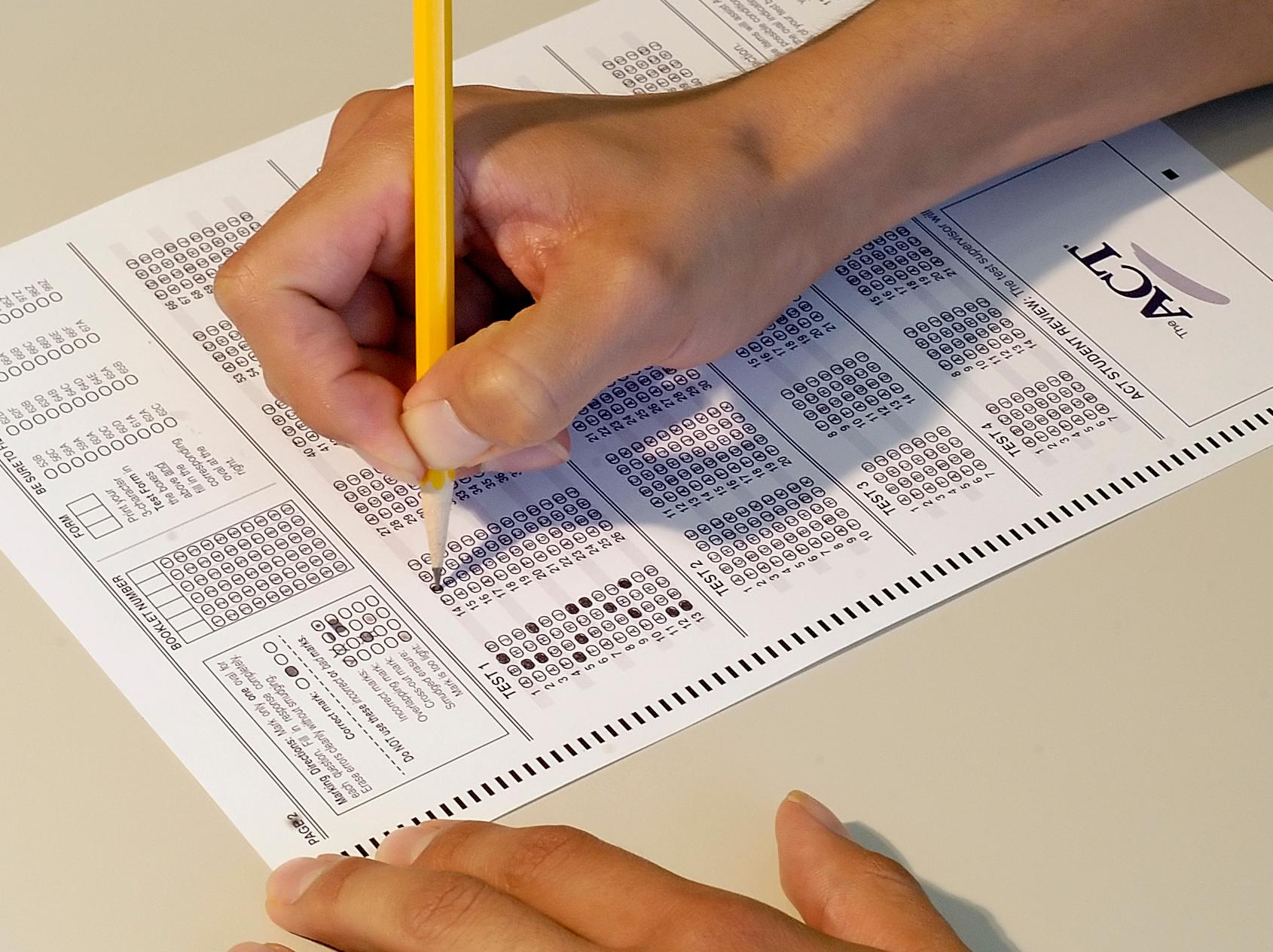
You might expect students to complain that they're taking too many tests. But a growing number of parents -- and even teachers -- are joining what has become a rebellion of sorts, saying that Colorado's intense focus on standardized testing is impeding education.
State lawmakers couldn't agree on what, if anything, to do about the issue last year. So they asked a task force to look into it. The issue is expected to pop up again this year in the Legislature.
CPR education reporter Jenny Brundin spoke with Colorado Matters host Ryan Warner about the key issues.
Ryan Warner: How do we know “thousands of Coloradans” are concerned about this?
Jenny Brundin: The task force has received hundreds of pages of public comment overwhelmingly saying, there’s too much testing. This November, about 5,000 12th graders opted out of taking the new state social studies and science tests.
Students in Boulder walked out of their tests into zero-degree temperatures?
Yes, that’s right. This is an issue that affects more than 850,000 Colorado school children.
What’s this task force supposed to be doing?
It has been studying how much students are tested and how many tests and how much class time tests are taking up. Also, they’re trying to examine the purposes of all of the different tests -- federal, state, district, and in-class tests. The task force is to give recommendations to the Legislature by Jan. 31.
Can you give us a sense of how many hours a week students spend on test prep and tests?
A recent survey of 2,700 Colorado teachers across all grades reveals they spend 16 hours each week on testing-related activities. Teachers are really concerned about the lost learning time. They also say they don’t have adequate curricula to meet the new standards. And they talk about “persistent” problems with testing on-line. Those problems range from kids not knowing how to type, to computers frequently crashing.
"Are we testing students’ computer skills or are we testing students’ content knowledge?" said Adele Bravo, one of only two teachers on the 15-member task force.
Nearly 70 percent said their school lacked the technology to carry out online assessments.

It’s important to understand that Colorado put in place more tests than the federal government requires. How did testing grow to what some are saying is an “out of control” level?
Students have had state tests since 1997, but with federal mandates and the big push to hold schools and teachers “accountable” for how well students do, the tests have piled up and the push back started. Parents are concerned that their students are talking increasingly in acronyms like IAs, MAPS, TCAPS, PAARC, CMAS, CBTs, ACTs, “formatives,” “summatives," more so than the content of what they are learning.
Are there any parents on the task force?
Yes, two. And they’re pretty clear about what they’d like to see. One is a clear way for parents to opt their children out of tests without the school being penalized. They also want fewer tests and more trust in teachers to know how students are doing.
"I know from the parents what we want is the resources at the teacher level so we don’t want this top down state mandated, check all these boxes, use up the resources," said parent Bethany Drosendahl, from Colorado Springs. "We want to empower the individual teachers to have this tool box full of tools to say, 'We’re demonstrating that we’re getting this child up to proficiency.' "
Jenny, can you talk about some of the decisions the task force has made so far?
With just a couple of meetings left, they have yet to take final votes. They’ve taken preliminary votes. They agree on scrapping all tests in 12th grade, because that’s not where students’ minds are as they’re getting ready for college.
The task force is also focused on scaling back some other tests. Right now high schoolers take three big standardized tests in English and math throughout their time in high school, (alongside their ACT college entrance tests). The group voted to scale that back to one -- in sophomore year, but districts would have the option to have a test in 9th and 11th grades if they want.
What about the younger grades? Third through eighth graders take standardized tests in every grade?
The task force realizes its hands are pretty much tied. The feds require these tests, so unless federal law changes, there’s not too much they can do. In terms of big standardized tests, they’re tested in third through eighth grades in English and math and twice in science and social studies each.
What about social studies tests? That caused a bit of a dust up in the Legislature last year.
Yes, Colorado this year launched state social studies tests -- called CMAS -- in grades 4, 7 and 12. That’s because the social studies lobby says there’s plenty of evidence to show that when the pressure on teachers amped up to have students perform well in English and math, social studies got pushed aside.
"When there was no assessment even though standards were in place, especially with subjects like economics and personal finance that are not as traditional, they just wouldn’t give it the same level of attention and time in the classroom," said Rob Linton, president of the Colorado Council for Economic Education.
But here’s Tony Lewis from the Donnell-Kay Foundation, a Denver-based education think-tank and a charter school representative:
"If we equate importance with testing, that’s the flaw, that’s the thing that drives me crazy on this in an ideal world I would take the money from the CMAS test and incent districts and schools to actually do the teaching and learning for social studies and not have any accountability associated with it."
So far, the group hasn’t decided on what to do about social studies.

Younger kids also have to take many more tests these days.
Yes, there’s a Kindergarten readiness observational test that’s dozens of pages long that teachers must perform. And then the new READ Act -- it was designed to help catch students with significant reading problems in early grades -- students must be tested every year. The group has discussed recommending that if students get a proficient mark twice in a row, they shouldn’t have to be tested again.
So it sounds like this task force has a lot of challenges.
Yes, the overarching challenge, they’ve realized, is everyone wants a testing system that does everything. They want one that lets the state grade and compare schools and districts, and gives information about individual students. And one that lets districts do the same thing more frequently. And then teachers want really fast feedback on how their students are doing. Susan Van Gundy sits on the task force representing PAARC, which is developing the new English and math tests for this spring. She argues that the new breed of tests students will get next spring will be better at giving teachers nuanced feedback about a student’s skills.
"We’re in a transitional phase where different assessments are being put into place that do address some of these issues in different ways than they have in the past," Van Gundy said. "And there hasn’t been the opportunity yet for the public, for schools for teachers to see that full implementation."
But teachers argue that it’s the classroom tests that give them quick feedback that is the most useful, the further away you get from the classroom, the testing doesn’t serve their purposes.
So members of the task force don’t have time to do a big overhaul and yet they know the public wants changes?
Yes. Syna Morgan, an administrator with JeffCo Schools, said she didn't think the senior walk out in November was an anomaly.
"I think there’s a growing frustration. And if we’re not addressing that in a significant way, if it’s a tweak here and a tweak there, that will be something the districts and CDE are going to have to address," Mordan said.
Parent representative Bethany Drosendahl said the stakes are high.
"The gist of the conversation among parents is if we don’t get relief, the next choice is mass opt out. Then the schools and the district and CDE will have to deal with it," Drosendahl said.
The task force meets next on Jan. 9, followed by one more meeting on Jan. 12. Then the task force makes recommendations to lawmakers, who may draw up legislation.









